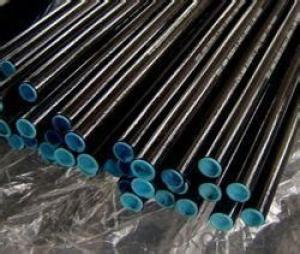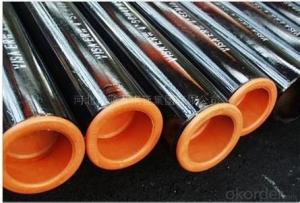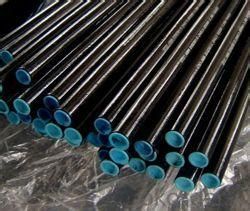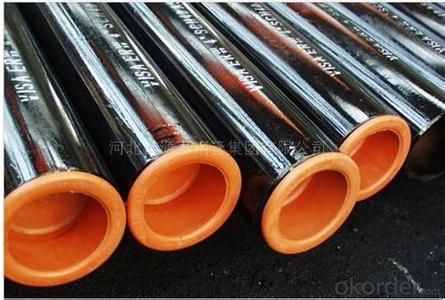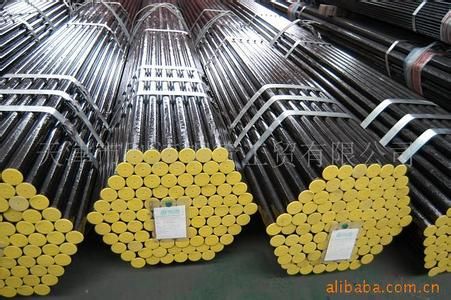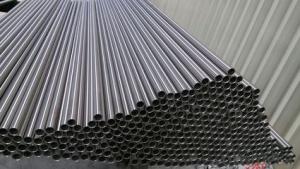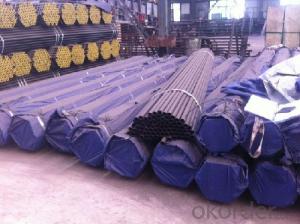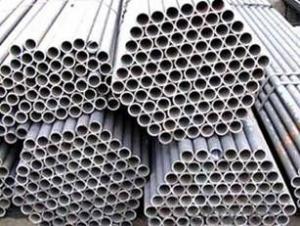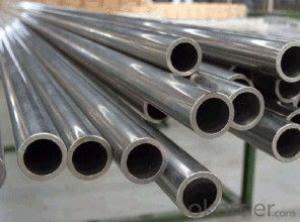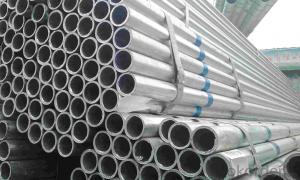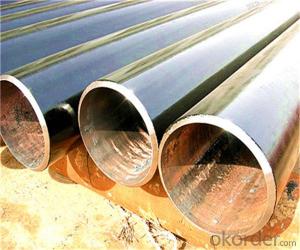Seamless steel tube in complete model of high quality
- Loading Port:
- Tianjin
- Payment Terms:
- TT or LC
- Min Order Qty:
- 25 m.t.
- Supply Capability:
- 6000 m.t./month
OKorder Service Pledge
OKorder Financial Service
You Might Also Like
1、Structure of Seamless steel tube:
Seamless pipe is formed by drawing a solid billet over a piercing rod to create the hollow shell. As the manufacturing process does not include any welding, seamless pipes are perceived to be stronger and more reliable. Historically seamless pipe was regarded as withstanding pressure better than other types, and was often more easily available than welded pipe.
2、Main Features of Seamless steel tube:
• High manufacturing accuracy
• High strength
• Small inertia resistance
• Strong heat dissipation ability
• Good visual effect
• Reasonable price
3、Seamless steel tube Images:
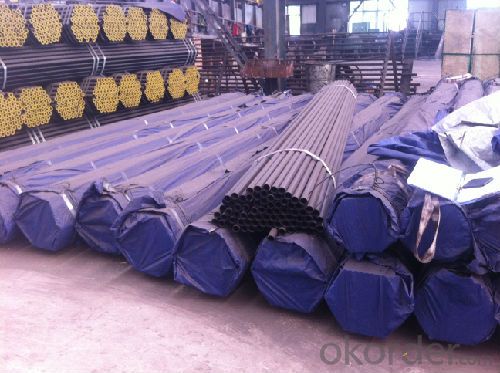
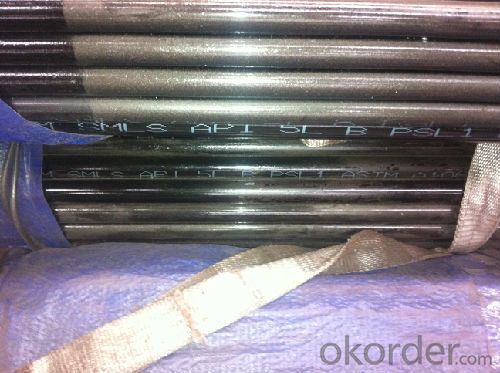
4、The Steel Pipe Specification:
Standard JIS, DIN, ASTM
JIS G3445-2006, JIS G3444-2006, JIS G3446-2004, DIN EN 10216-1-2004, DIN EN 10217-1-2005, DIN EN 10305, ASTM A106-2006, ASTM A53-2007, ASTM A789-2001, ASTM A1020-2002, ASTM A179-1990, ASTM A199Grade Cr-Mo alloy, Mo, ST35-ST52, Q195-Q345, CrNi alloy
15CrMo, 10CrMo910, 30CrMo, 15Mo3, 16Mo, St37, St52, St42, St45, Q235, Q345, Q195, Q215, Cr17Ni8, 1Cr13Mn9Ni1NThickness 2 - 50 mm Section Shape Round Outer Diameter 10 - 900 mm Secondary Or Not Non-secondary Application Structure Pipe Technique EFW Certification API Surface Treatment Paint Special Pipe API Pipe Alloy Or Not Non-alloy
5、FAQ of Square Tube:
①How is the quality of your products?
Our products are manufactured strictly according to national and internaional standard, and we take a test
on every pipe before delivered out. If you want see our quality certifications and all kinds of testing report, please just ask us for it.
Guaranteed: If products’ quality don’t accord to discription as we give or the promise before you place order, we promise 100% refund.
②How about price?
Yes, we are factory and be able to give you lowest price below market one, and we have a policy that “ for saving time and absolutely honest business attitude, we quote as lowest as possible for any customer, and discount can be given according to quantity”,if you like bargain and factory price is not low enough as you think, just don’t waste your time.Please trust the quotation we would give you, it is professional one.
③Why should you chose us?
Chose happens because of quality, then price, We can give you both.Additionally, we can also offer professional products inquiry, products knowledge train(for agents), smooth goods delivery, exellent customer solution proposals.Our service formula: good quality+good price+good service=customer’s trust
SGS test is available, customer inspection before shipping is welcome, third party inspection is no problem.
Any question, pls feel free to contact us !
- Q: What is the difference between steel pipes and PVC-U pipes?
- Steel pipes and PVC-U pipes differ in their composition, durability, and application. Steel pipes are made from iron and carbon, providing them with high strength and resistance to extreme conditions. They are commonly used for transporting water, gas, and oil in industrial settings due to their durability and ability to withstand high pressure and temperature. PVC-U pipes, on the other hand, are made from a synthetic plastic called polyvinyl chloride. They are lightweight, corrosion-resistant, and easy to install, making them ideal for residential plumbing, irrigation systems, and drainage. While steel pipes are more robust and suitable for heavy-duty applications, PVC-U pipes are cost-effective, versatile, and suitable for lighter applications.
- Q: Are steel pipes fire-resistant?
- Yes, steel pipes are fire-resistant. Steel is a non-combustible material, which means it does not burn or contribute to the spread of fire. Steel pipes have high melting points and can withstand extreme temperatures, making them highly resistant to fire. They are commonly used in various applications where fire protection is crucial, such as fire sprinkler systems, fire hydrant systems, and fire-resistant building structures. Additionally, steel pipes are also known for their durability and strength, which further enhances their fire resistance capabilities.
- Q: Can steel pipes be used for roller coaster tracks?
- Yes, steel pipes can be used for roller coaster tracks. In fact, they are one of the most common materials used for roller coaster tracks due to their strength, durability, and versatility. Steel pipes provide excellent support and stability for the roller coaster cars, ensuring a safe and thrilling ride experience for passengers. Additionally, steel pipes can be easily shaped and welded to create various track designs, including loops, twists, and turns, making them ideal for creating exhilarating roller coaster layouts. Furthermore, steel pipes are resistant to corrosion and can withstand harsh weather conditions, making them a reliable choice for outdoor roller coasters. Overall, steel pipes are a popular and reliable choice for roller coaster tracks, offering both safety and excitement for riders.
- Q: What is the difference between seamless steel pipes and seamless stainless steel pipes?
- The main difference between seamless steel pipes and seamless stainless steel pipes lies in their composition. Seamless steel pipes are typically made from carbon steel, which is an alloy of iron and carbon. On the other hand, seamless stainless steel pipes are made from an alloy of iron, carbon, and chromium, which gives them enhanced corrosion resistance and durability. This makes seamless stainless steel pipes suitable for applications where resistance to corrosion is essential, such as in the food industry or in environments with high humidity or exposure to chemicals.
- Q: How do you determine the maximum allowable stress for steel pipes?
- In order to establish the maximum allowable stress for steel pipes, several factors must be taken into account. These factors encompass the type of steel, the dimensions of the pipe, and the operating conditions it will be exposed to. To begin with, the type of steel chosen is a pivotal aspect in determining the maximum allowable stress. Different steel grades possess distinct mechanical properties, including yield strength, tensile strength, and elongation. These properties define the steel's capacity to withstand stress before deforming or failing. Hence, it is crucial to comprehend the specific grade of steel employed in the pipes to ascertain the maximum allowable stress. Additionally, the dimensions of the pipe are of utmost importance. The external diameter, wall thickness, and length all impact the pipe's strength and ability to handle stress. By calculating the cross-sectional area and moment of inertia, engineers can evaluate the pipe's resistance to bending and axial stresses. These calculations, combined with the material properties, facilitate the determination of the maximum allowable stress. Finally, the operating conditions under which the pipe will be utilized play a critical role. Variables such as temperature, pressure, and the presence of corrosive substances can significantly influence the maximum allowable stress of a steel pipe. Elevated temperatures can alter the mechanical properties of the steel, while high pressures can induce additional stress. Furthermore, the presence of corrosive substances can lead to material degradation and diminish the pipe's strength. Thus, considering these operational factors is essential when determining the maximum allowable stress. To summarize, the process of establishing the maximum allowable stress for steel pipes entails assessing the specific steel grade, the pipe's dimensions, and the operating conditions. By analyzing these factors, engineers can ensure that the steel pipe is designed and utilized within its safe stress limits.
- Q: Can steel pipes be used for underground heating systems?
- Yes, steel pipes can be used for underground heating systems. Steel is a durable and robust material that can withstand the pressure and temperature requirements of heating systems. Additionally, steel pipes are resistant to corrosion, which is crucial for underground applications where exposure to moisture and other elements is common.
- Q: How are steel pipes used in the construction of oil-fired power plants?
- Steel pipes are commonly used in the construction of oil-fired power plants for various purposes. They are primarily utilized for the transportation of oil and other fluids within the plant, including fuel oil, lubricants, and cooling water. Steel pipes are also used for the installation of high-pressure steam and water lines, as well as for the construction of exhaust systems, ventilation ducts, and other structural components. Overall, steel pipes play a crucial role in ensuring the efficient and reliable operation of oil-fired power plants.
- Q: How are steel pipes used in underground drainage systems?
- Steel pipes are commonly used in underground drainage systems to transport wastewater and stormwater away from buildings and infrastructure. These pipes are durable and resistant to corrosion, making them suitable for underground applications. They are typically used for main sewer lines and stormwater drains, providing a reliable and long-lasting solution for effective drainage.
- Q: Can steel pipes be used for underground chemical pipelines?
- Indeed, underground chemical pipelines can utilize steel pipes. The chemical industry, among other industries, extensively employs steel pipes owing to their robustness, potency, and resistance to corrosion. To ensure suitability for underground chemical pipelines, it is crucial to select an appropriate steel grade that can withstand corrosion from the specific chemicals being transported. Furthermore, the resistance of steel pipes to chemical corrosion can be further augmented through the implementation of suitable coating and lining techniques. Regular inspection and maintenance are imperative to guarantee the integrity and safety of the underground chemical pipeline system.
- Q: What are the different pipe fittings used with steel pipes?
- Some common pipe fittings used with steel pipes include couplings, elbows, tees, unions, reducers, and caps.
Send your message to us
Seamless steel tube in complete model of high quality
- Loading Port:
- Tianjin
- Payment Terms:
- TT or LC
- Min Order Qty:
- 25 m.t.
- Supply Capability:
- 6000 m.t./month
OKorder Service Pledge
OKorder Financial Service
Similar products
Hot products
Hot Searches
Related keywords
